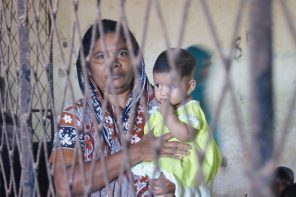Last week, Muzzammil Hassan apparently beheaded his wife, Aasiya Zubair. Although the reasons for this heinous act currently remain unclear, there was a history of domestic violence.
God rest her soul.
Mr. Hassan was co-founder, with his wife, of Bridges TV, a station dedicated to improving the image of Muslims in the US. His work was well-known and admired, and the case has shocked American Muslims. Although their private life was private, it was assumed that a couple who lived and worked together for eight years did not have more than average amount of spousal disagreement.
As a community the depravity of this act has put two things in sharp relief:
- We have begun to lose our sense of humanity. We are becoming the beast we are named.
- Domestic Violence hits everyone.
Immediately after the news broke, my first thought was crisis management. What does this event mean for the Muslim-American community? How will Muslims be perceived? As a Muslim, my first thought should have been to pray for the soul of the departed. Then I should have thought of the immediate concern, is there a family that needs to be cared for? What can we do to help? Instead, I became the Pan from Salman Rushdie’s Satanic Verses, who, called “beast” often enough, becomes one. I forgot my humanity. I’m sure I’m not the only one. The last few days have been spent trying to figure out how to help the four children left behind; the two oldest are from a previous marriage and will have some financial support, but the two youngest, 4 and 6, have no one.
I cannot fathom the anger, the rage that would result in a beheading. According to my TV, crimes of passion tend to be the most violent, but a beheading is just such a foreign concept, in any context, that it is inconceivable. Yet it happened. I believed that it would be described as an expression of innate Muslim values, as though only Muslims are capable of such a crime. Although there is no monopoly on violence, there is a discourse that projects violence as being only a Muslim trait. A typical Orientalist fantasy that holds that the “Other” is inherently violent no matter what the reality may be. Thankfully, aside from some of the fringe sites, the media has been responsible in reporting this as a case of domestic violence.
Horrible things are done to women every day, every minute, everywhere, by all kinds of people. It’s not as though we are not aware of violence against women in the Muslim community. We are and we are trying to do something about it. But a moment like this shows how immediate the need is. The reality is that every community suffers from forms of domestic violence. It’s not about religion; it’s about power and control. We don’t know why Aasiya Zubair was slaughtered. We do know that in difficult economic times, men tend to act out more, in an attempt to exercise control. We are seeing an increase in domestic violence issues, and this case is one of a larger pattern, that has nothing to do with religion.
The challenge now, is how to respond as a religious community. Immediately, we must help the children who are now effectively fatherless and orphaned. I will post details here as they become available. Next, we must work more actively understand domestic violence and to spread the message of groups working on domestic violence issues. Lastly, we have to remember our humanity.
NB: There is a FaceBook that is related to this story. In Memory of Aasiya Zubair: A Pledge to End Domestic Violence.




